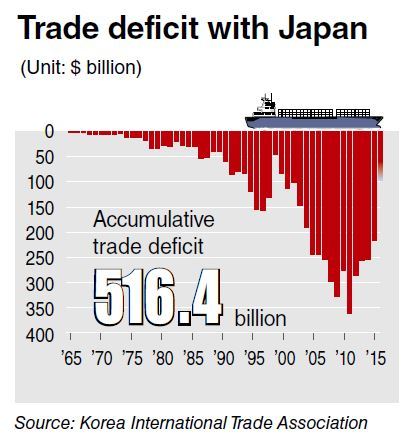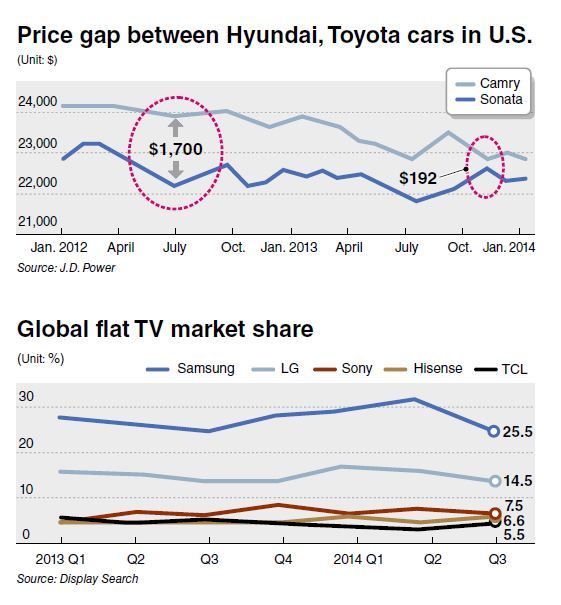For decades, the Korea-Japan rivalry has favored Korean firms and helped them secure a firm footing in global markets.
In the past, they were desperate to mimic the success of big Japanese names such as Sony and Toyota. But over time, companies like Samsung and Hyundai appealed with quality products at cheaper prices, gobbling up their Japanese rivals’ market shares.
Today Korean and Japanese firms compete head-on across almost all industries. And when it comes to information technology, Koreans have long outpaced their Japanese rivals.

In recent years, however, their competition has entered a new phase. Capitalizing on a weak yen, Japanese companies have improved profits, pouring resources into R&D.
Korean firms, most of them being exporters, have been hit hard by the Japanese offensive.
Japanese carmakers are cutting car prices, taking advantage of the favorable foreign exchange rates. They are also producing more cars on their home turf for better profits.
In the U.S. market, the price gap between Hyundai Sonata and Toyota Camry — the carmakers’ top-selling midsize sedans — has been reduced from $1,700 in 2012 to $192 last year.
China, the world’s largest car market, has driven Hyundai’s overall growth in recent years. But in the first half of this year, Hyundai’s Chinese sales fell 8 percent from a year ago largely due to the greater affordability of cars from Japanese carmakers.
While Hyundai-Kia’s market share dropped from 9.1 percent to 7.3 percent in July, Toyota and Nissan increased their market share to 4.2 percent and 6.2 percent, respectively.
In the second quarter of this year, Toyota posted a record profit of 550 billion yen, 10 percent up from a year ago. Honda and Nissan also improved profits.
But Hyundai’s operating profit fell for the fifth consecutive quarter. Its operating profit was 1.75 trillion won, down 16.1 percent from the same period last year.
Samsung Electronics’ earnings also missed forecasts. Its second-quarter profit was 6.8 trillion won, a 4 percent decrease. Is revenue fell 7.3 percent to 48.5 trillion won.

The weak yen was instrumental in helping its old rival Sony return strongly after years of sluggish sales. Its operating profit surged 39 percent to 96.9 billion yen from a year ago.
Industry watchers say the short-term earnings recovery of Japanese firms may not be a big issue, but their improved profits would lead to new investments in R&D and new products that could pose a serious threat to Korean firms.
In order to fend off challenges, Korean players are also stepping up efforts by starting new growth engine businesses and expanding overseas production plants.
In TVs and other home appliance products, Samsung and LG still dominate global markets based on their premium products. They expect a limited impact from the weak yen.
The world’s No. 1 and 2 chipmakers, Samsung and SK Hynix, are also expanding their premium lineups to widen the gap with runners-up, introducing new chips not just for smartphones but also for other mobile devices and wearables.
Hyundai plans to build more manufacturing plants in China to beef up the number of cars in the all-important market. The carmaker aims to build the fourth and fifth plants in China with a combined production capacity of 300,000 cars per year by 2016.
“In the past, the weak yen hit Korean firms hard. But now they have strengthened competitiveness enough to minimize the impact,” said Park Hong-jae, head of the Korea automotive Research Institute.
In the meantime, this year the Korea-Japan trade volume fell to the lowest level since the two neighbors started diplomatic exchanges 50 years ago.
In a recent report by the Korea International Trade Association, Korea’s trade volume with Japan made up a tiny 7.6 percent of the total in the first five months of this year.
The figure is the lowest ever, and compares to 34.5 percent in 1965 when the two countries resumed ties.
Japan was one of the top three trading partners for Korea until last year. This year it fell to the fifth.
Experts cited global economic slowdown and weak yen as key factors behind the dwindling trade volume.
“The two governments should make more aggressive efforts to recover their diplomatic ties, which is crucial for revitalizing their economic partnership,” said the KITA report.
By Lee Ji-yoon (jylee@heraldcorp.com)



